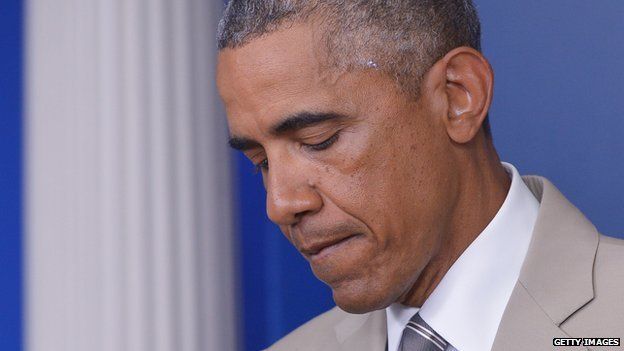Obama on IS: 'No strategy' remark reveals political truth
- Published
- comments

"We don't have a strategy yet."
President Barack Obama spoke a great deal about Syria, Iraq and the Islamic State (IS) in Thursday's press conference, external, but these six words are dominating the non-beige-suit-related discussion among US politicians and pundits.
The line was part of the president's response to a question about whether he needs Congress's approval to "go into Syria". It seemed a frank admission that the administration is grappling with how to engage its military against rebel forces less than a year after it had all but decided to bomb the Syrian soldiers now fighting them.
Frankness, however, is an unusual attribute in the Washington corridors of power.
Mr Obama's line is a textbook example of veteran journalist Michael Kinsley's definition of a political gaffe, external, which occurs when a politician tells an "obvious truth that he isn't supposed to say".
But is that "obvious truth" that the Islamic State situation is beyond an easy fix or that the president is blundering without a foreign policy vision? (Or both?)
It all depends on perspective.
The president's critics were quick to apply the line to what they see as the administration's lack of a detailed plan for confronting the IS threat throughout the region.
The Federalist's Mollie Hemingway says, external that the no-strategy phrase "perfectly encapsulates" what's wrong with the president's foreign policy.
"The problem isn't just the lack of strategy for a situation that should not have caught us by surprise but the decision to be extremely public about being tentative," she writes. "There is just absolutely no reason to hand that kind of morale boost and public relations victory to all of your enemies."
Mr Obama refuses to accept the fact that we're at war, writes, external the Weekly Standard's William Kristol. Because of this reluctance, he continues, the president's moves in the Middle East are hesitant, defensive and haphazard.
"To organise for war, to articulate a strategy, to commit to victory - all of this would make the Obama presidency a war presidency," Kristol says. "But being a war president doesn't comport with Barack Obama's self-image."
Analysis: Jon Sopel, North America Editor
'We don't have a strategy yet', is one of those things you don't expect presidents to say out loud. But maybe it is a mark of the divisions that exist within the administration over how hawkish to be about Islamic State.
What this statement from the president does show is firstly just how complex the military options are in attacking Islamic State in Syria.
But most importantly it shows the extreme wariness of this president to unilaterally start military action when it's not clear where it will end.
So next week John Kerry will go on from the NATO summit in Wales to the Middle East to build support for US action in Syria.
But maybe the president was also sending a message to European leaders like Prime Minister David Cameron that says don't expect America to do all the heavy lifting on this by itself.
In return, maybe in his statement on raising the UK terror alert, Mr Cameron was signalling back: you won't have to.
But it is also worth just adding this: exactly this time a year ago, Mr Obama was preparing to attack targets of the Assad regime. Twelve months on he's looking to attack President Assad's opponents.
That is a mark of just how complex the politics is - and might explain why the president is still trying to define a strategy
Republican politicians also hurried to respond. With November's midterm elections looming, any foreign policy stumbles by the president could translate into political gain.
"President says 'we don't have a strategy yet' to deal with #ISIS," tweeted, external Congressman Tom Price. "That's obvious and increasingly unacceptable."
"I'm just not sure the severity of the problem has sunk in with the administration just yet," Congressman Mike Rogers, chair of the House intelligence committee, said on CNN, external. "It was an odd press conference at the very best."
The Daily Beast's Josh Rogin and Eli Lake say, external that behind the president's statement is a lack of consensus among the administration's foreign policy team.
While some officials advocate air strikes against IS inside Syrian territory, others counsel a more cautious approach focusing on Iraq. It was this approach that the president appeared to endorse on Thursday, as he pledged to "roll back" IS gains in Iraq.
"Those inside the administration advocating for going after IS in both Iraq and Syria were sorely disappointed - and lamented their boss's lack of urgency in rooting out a threat that only days before was being described in near-apocalyptic terms," Rogin and Lake write.
As the drumbeat of criticism grew, the administration attempted to push back. White House press secretary Josh Earnest tweeted, external: "In his remarks today, POTUS was explicit - as he has been in the past - about the comprehensive strategy we'll use to confront the IS threat."
Others defended the president's words, arguing that the US should not commit to military action without carefully considering the consequences.
"Better to be tentative about strategy when there are no easy answers than claiming to have strategy when don't," tweeted, external King's College war studies Prof Lawrence Freedman.
The Atlantic's Peter Beinart says the president is offering the minimalist Middle East strategy that the American public wants
The Atlantic's Peter Beinert says, external the president does have a strategy in the Middle East - a minimalist approach that limits intervention and focuses on counter-terrorism.
"President Obama's Mideast strategy is not grand," he writes. "It's not inspiring. It's not idealistic. But it's what the American people want and what their government knows how to do."